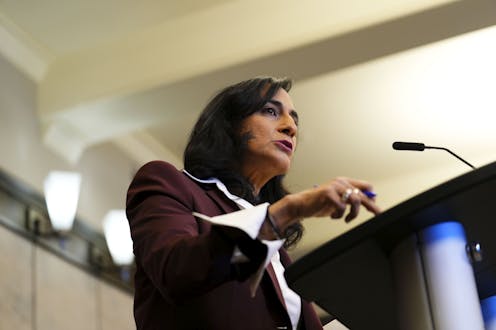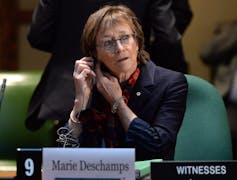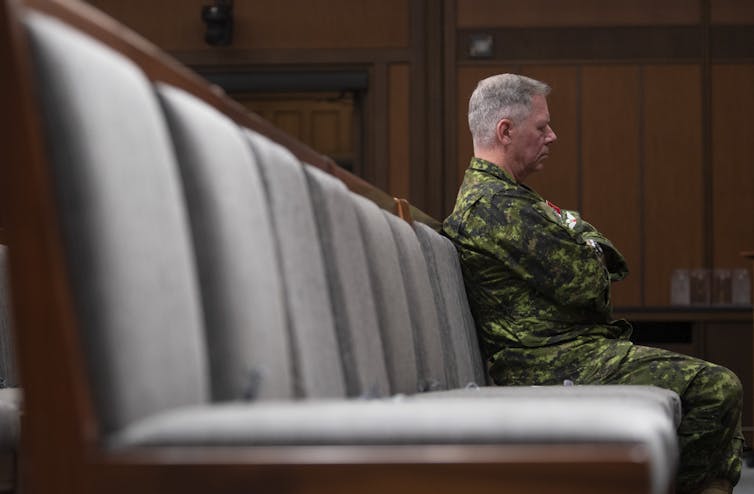
Sexual violence in the Canadian Armed Forces (CAF) is a common, dominant and serious issue that has severe consequences for victims — not to mention its impact on unit cohesion and morale.
Workplace violence is an ever present issue in Canadian society, impacting nearly three-quarters of Canada’s workers. Measures must be taken to treat any workplace violence as a public health issue.
Read more: Workplace bullying should be treated as a public health issue
But the impenetrable closed culture of the CAF in particular is prime real estate for predators and those who seek to abuse authority.
For perspective, a quarter of the women serving in the CAF say they’d reported sexual assault at least once during their military careers. The true extent is likely under-reported given a recent study that indicates 80 per cent of sexual assaults go unreported.
Canada set aside close to $800 million in 2019 to settle class-action lawsuits by current and former military members involving sexual misconduct. What’s lacking, however, is a coherent national strategy to prevent, address and reset the culture of sexualized violence within the CAF.
Anand’s first move
In November 2021, Defence Minister Anita Anand’s first act was to announce the transfer of the investigation and prosecution of sexual misconduct cases from within the Canadian Forces to the civilian justice system.
One year later, on Dec. 13, 2022, Anand stepped in front of the cameras to apologize to former and current members of the CAF for the culture of violence and to those who have survived sexual misconduct and assault. The apology was likely meant as a meaningful step towards reconciliation.
Her comment, however, that “this time is different,” raises concerns. The question becomes: “How so, and why should we believe the government this time?”

Organizational culture is often so firmly entrenched that changes in strategy have little impact. So Anand is sounding like a broken record because the CAF’s traditions, culture and much of its toxic leadership haven’t changed.
In 2015 — almost a decade ago — the CAF released an external report detailing the results of a survey on sexual misconduct in the organization conducted by Marie Deschamps, a former Supreme Court justice.
The survey found that women in the CAF endure a toxic work environment and are often the target of vulgar name-calling, sexual innuendo and jokes, harassment and assault — much of it condoned or ignored by senior military leaders. The track record of the CAF’s leadership in dealing with the issue of sexual misconduct, as well as ministerial oversight, is abysmal.
The CAF’s response
In response to the 2015 survey, the CAF implemented several initiatives aimed at addressing sexual misconduct in the organization, including creating a Sexual Misconduct Response Centre (SMRC) and appointing a Special Advisor on Sexual Misconduct.
The Special Advisor works with the CAF to identify and address the root causes of sexual misconduct and to develop and implement strategies to prevent it. Clearly this arrangement hasn’t been working.
The CAF also implemented a policy called Operation HONOUR, referred to as an enduring mission with no end date by Lt.-Gen. Mike Rouleau, with a plan to eliminate sexual misconduct in the military and support survivors. At this point, that mission has also been a failure.
Since Operation HONOUR was launched in 2015, several of Canada’s top military officers have been accused of sexual harassment.
Former top commander Jonathan Vance pleaded guilty in 2022 to criminal charges related to accusations that he committed sexual misconduct when leading the Armed Forces, despite stating that sexual misconduct was “a threat to this institution.”

In 2018, the CAF released a report on the progress made in addressing sexual misconduct in the organization.
It found that the number of reported sexual assaults had increased, in some ways a positive development because it indicated more survivors were coming forward and seeking support. The findings suggest the CAF has made some progress in increasing awareness of sexual misconduct and improving support for victims, but the organization’s culture is clearly not changing at all.
The enemy is in the same uniform
So now what?
As someone who specializes in workplace violence, it occurred to me that if I were a parent of a child who was contemplating a career in the CAF, I would need to have a difficult conversation about the likelihood of sexual assault.
Sit with that for a minute. When we think about the CAF, we acknowledge the duty, honour and courage of most of those who serve. However, the clear and present danger is not just in distant battlefields — but also from those serving in the same uniform as you.
Read more: Sexual misconduct, abuse of power, adultery and secrecy: What I witnessed in Canada’s military
The likelihood of adverse mental health outcomes — including anxiety, depression and PTSD — may not just come from what is experienced in battle but what is inflicted by a brother or sister in arms, severely impacting the trust, credibility and honour of the CAF.
The CAF has created a restricted culture with a leadership team lacking in diversity, inclusion and the considerations of equity. These leaders have learned from others who have perpetrated sexual misconduct.
Prevention, intervention and post-intervention measures for dealing with sexualized violence in the CAF are not considered mission-critical by the organization — but they need to be.
So is this time different? Is genuine culture change truly on the near horizon at the CAF? I hope so, but unfortunately hope is not a strategy.
Jason Walker is affiliated with Liberal Party of Canada, holding a general membership.
This article was originally published on The Conversation. Read the original article.







